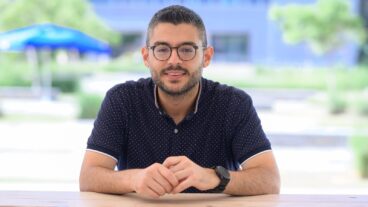Gil Shohat: When I conduct, I hear the sound in my head a second before I get it.He’s likeable, sophisticated, media-savvy, workaholic, something of a celebrity in his native Israel, dedicated, unpretentious, successful, single and very, very, very talented.
He’s Gil Shohat, former wunderkind (child prodigy in Yiddish), today a 32-year-old pianist, teacher, conductor of the Israel Chamber Orchestra, and arguably one of Israel’s most prolific and widely known composers.
He has to his credit nine symphonies, eight concerti for various instruments, two operas and a hefty bundle of choral, chamber and piano works that are performed locally and internationally. And that list doesn’t include a growing number of international commissions such as Songs of Bathsheba, an oratorio based on the psalms of David. It was written for Soli Deo Gloria in Chicago and premiered in the fall by the Milwaukee Symphony Orchestra and Choir.
“He’s the closest thing we have to Mozart in our society,” blurts one of his many fans as she hugs him, and Shohat hugs her right back, blushing. He?s come to this particular place to present a lecture on Richard Wagner operas and it’s duly delivered with panache and humor.
Zest is a good word for Shohat at work. At a rehearsal of the ICO the previous day he was doing a Strauss waltz, singing, humming, and digga-digging along as he simultaneously cajoled the drummer onto a different drum with a different beat.
“Conducting and composing don’t go together like fish and chips,” he tells ISRAEL21c, laughing at the analogy, “but conducting is an important brick in the house of my musical personality that complements and enforces my beliefs. When I conduct, I hear the sound in my head a second before I get it. That’s the secret. You hear the sound and then transmit it to the orchestra.”
Shohat became music director of the ICO last fall, the youngest conductor ever of a major local orchestra. Fitting, since it was the ICO that in 1991 commissioned and performed his early work, The Nightingale and the Rose. Shohat was then 18.
The artist’s first composition was the 12-minute Fantasia for solo piano, written when he was 12 and very seriously studying piano.
“I was already learning theory,” he says, “and I was asked to write a few lines for the piano. I decided to write something I could perform at a recital. I still have the manuscript. I see in it the writing of a child, for sure, but also a lot of ambition and something that’s calling to get out.”
His career direction was born when he was four and his kindergarten teacher had told his parents “this child needs to learn music.” They were subsequently told that four was too young to begin, so little Gil started piano at seven years old.
“My father said, ‘we’ll get you a piano only if we see you’re serious,'” he recounts. “I got my piano after walking to the conservatory every day for 18 months to practice.”
Truly gifted child musicians are recognized and rewarded in Israel, so young Shohat swept through the Israel Music Conservatory and the Rubin Academy of Music on scholarships and sponsorships. He completed his army service as commander of the Israel Defense Forces Chamber Orchestra, and after he got his Masters of Music, summa cum laude he spent three more years studying, two of piano and composition in Italy and one more at Cambridge, England.
His sojourn abroad rubbed off the spikiness that sometimes characterizes Israelis, but whenever he goes abroad, and he travels a lot, “people know I’m Israeli. I’m definitely and by definition an Israeli and people ask me about Israel a lot. I do regard myself as a cultural ambassador, but not just for Israel, for the Jewish people, because my [vocal] music is performed in Hebrew in non-Jewish places.
“Many of my pieces deal with Israel and Jewish issues. I draw much of my inspiration from the Bible, like Bathsheba and The Song of Songs. My opera Alpha and Omega is a parable of the Adam and Eve story. Sure Israel has problems, but my Israel, the one I talk about, has 14 orchestras, sells 3.5 million theater tickets annually and two million for classical music and is the best talent factory in the world.”
He’s living proof of this – and even in the ‘factory,’ his level of talent was unmistakable.
It was during a stay in Italy that the eminent music publishers Ricordi signed him to a contract, their youngest ever client.
This was in 1996, the year he wrote his first violin concerto. It premiered in Israel to near hyperbolic reviews.
“All of a sudden, Israeli music has a genuine violin concerto,” raved musicologist and music critic Dr. Hanoch Ron, “The concerto is an anthem for a virtuoso dialogue between soloist and orchestra… It’s genuine hutzpa for such a young man to achieve an ideal balance between intellectual and emotional expression.”
“He was born to be a composer,” says Ron, an unabashed fan still. “His music flows and takes you with it; it’s adventurous. He thinks big. His composition is epic and he has a sense for the dramatic. He’s a romantic and emotional but avoids the sticky and sentimental. His works usually tell a story and always man is in the center, and that’s important. He orchestrates marvelously and at the highest possible standard, on a par with Ravel, or Richard Strauss, I’d say, and what’s very special is his feel for orchestral tone and color. He can write a piece for four instruments and you can sit there hearing eight.”
That same violin concerto was his US debut the following year when the Ra’anana Symphonette – he was its in-house composer at the time – performed it at the opening of the new performing arts center at Newark, New Jersey.
If the violin concerto was the start, the previously mentioned Alpha and Omega definitely tipped the scale towards success and recognition. The opera had its world premiere at the Israel Opera in 2001, acclaim for the music was universal and it showed that Shohat had definitely arrived on the international music stage.
Success sits on him lightly, and he all but shrugs off a question about it.
“I don’t know what makes a success. I think much more about doing what I have to do – writing, planning, conducting, lecturing, expressing myself as a musician.”
From that point of view “Alpha and Omega changed peoples’ attitude to Israeli music,” he says, and it’s because the music, his music, talks to them, because it’s accessible, because it connects. “I have to be very close to myself, and to write in a language I understand. If you understand yourself, then others will understand you. I really believe that.”
What he means is that melody has come back to concert music, and not just here. He believes that his music speaks “for the new voice of young composers worldwide.
“I believe concert music is the next big thing. We’ll be able to absorb many ‘refugees’ from such as hip-hop, pop, trance, get back the millions the concert hall lost to light music when the avant-garde movement banished melody.”
American audiences will be able see some select performances by Shohat during the year, before he takes the ICO on the road near the end of 2007 for an extensive concert tour of the US..
Shohat, a disciplined professional, writes everyday. In the old days he composed at night, “but now that I’m the music director of the ICO and of the Israel Festival, I have to get up at eight o’clock, so I try to write during the day.”
He avoids writing music on the computer. He writes with a fountain pen in black ink “but sometimes I feel the ink is red because it’s sucking my blood. Composing is not easy. It’s one of the hardest, most painful, irritating, nerve-racking processes in my life. But the result is so very rewarding.”












